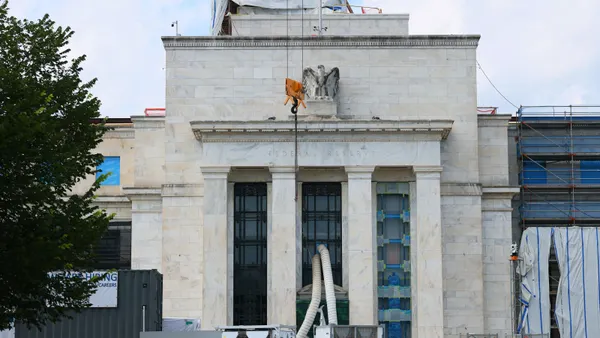Dive Brief:
- Corporate spend management startup Ramp said today it has raised $750 million in venture funding, bringing its valuation to $8.1 billion.
- The funding includes $200 million in fresh equity funding from a group of investors led by Founders Fund, and $550 million in debt financing. Existing investors Stripe and Thrive Capital also participated in the funding round.
- This brings New York-based Ramp’s total capital raised to about $1.4 billion since its 2019 founding. Funding will be used to accelerate development of Ramp’s financial automation tools and integrate more features. "That’s kind of been the core of Ramp and what we continue to hear users and customers value most," said Chief Business Officer Colin Kennedy in an interview.
Dive Insight:
Kennedy said the three-year-old startup, founded by Eric Glyman and Karim Atiyeh, is focused squarely on helping companies become more profitable through finance automation and giving finance professionals better visibility across areas of company spending. Saving companies money is the goal, Kennedy said.
With the new infusion of capital, Kennedy said the company plans to expand into new verticals, add more employees and launch additional features that further automate expense management processes. The debt financing, which includes $300 million from Citigroup and an additional $150 million from Goldman Sachs, will support Ramp as it scales.
Despite some pullback in the venture capital market, Kennedy said Ramp is fortunate that new funding was driven by current investors, who want to see revenue and customer base growth. For Ramp, "those metrics have remained extremely strong," Kennedy said.
Ramp now has about 5,000 business clients, up seven times over last year. The company declined to provide last year’s revenue figure. Ramp expects about $5 billion of annualized payments volume on its platform.
Kennedy said Ramp, which makes money through card interchange fees, still serves just a fraction of the overall market.
Competitors in the space include larger incumbents American Express, Chase and Capital One, as well as Expensify and Concur on the expense management side. Another competitor, fellow fintech Brex, has also raised more than $1 billion, per TechCrunch.
As Ramp continues to expand its financial automation capabilities, "we don’t hear from customers or see, as we talk to prospects, that there are other companies directly addressing this problem in this space where we’re playing," Kennedy said.
Given that Ramp launched with a focus on the corporate card, its second act "has massive potential," Founders Fund partner Keith Rabois said in the release. He's held executive roles at PayPal and Square in the past.
In February, Ramp introduced a travel offering to let clients enforce their employee travel and expense policies, automatically collecting travelers’ receipts for processing on the backend.
With the capital infusion, Kennedy said the company also aims to land more partnerships. Those with Amazon Business, Gmail and Lyft that involve automatic receipt collection have "resonated strongly with our base, and there’s a lot more we know we’d like to do there," Kennedy said.
Kennedy said Ramp wants to continue to make the user side as seamless as possible, while also automating as much as possible for finance teams. The company’s also intent on growing its B2B payments tool Bill Pay, which launched in October 2021.
"We know that as much as the feedback’s been positive so far, there’s a lot more that finance teams are asking for, and we will focus on delivering to try to improve that automation," Kennedy said.
Ramp has about 275 employees. Kennedy said the company expects the employee headcount to be nearly double that by the end of 2022. A Miami office will open this summer, although Ramp will remain headquartered in New York. The company is not currently planning to go public, Kennedy said.
Ramp has made one acquisition so far, of negotiating platform Buyer in August 2021. Kennedy said Ramp would consider future acquisitions that could be accretive to Ramp's product offering.
Currently, however, the company is focused on developing its core product. "The focus is not on inorganic growth right now," Kennedy said.













